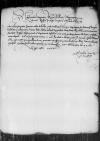Letter #2672
Sigismund I Jagiellon to Ioannes DANTISCUSWielowieś, 1543-10-25
| received Heilsberg (Lidzbark), 1543-11-03 Manuscript sources:
| ||||
Text & apparatus & commentary Plain text Text & commentary Text & apparatus
Reverendo in Christo Patri, domino
Reverende in Christo Pater, sincere nobis dilecte.
Petitionibus
S(trenuitatis) or S(inceritatis)⌈S(trenuitatis)S(trenuitatis) or S(inceritatis)⌉ Vestrae pro capitaneo suo Braunsbergensi
habebitur a nobis ratio. Veniet hisce diebus ad nos generosus
Eandem feliciter valere optamus.
Ex
Ad mandatum sacrae regiae maiestatis


 BCz, 1601, p. 486
BCz, 1601, p. 486